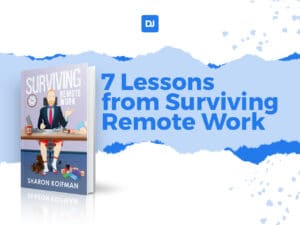Customer services are a tricky matter since it can single-handedly make or break a company when it comes to customer satisfaction and loyalty. Consider the example of Help Scout. They’ve helped over 7,000 businesses manage customer support with leading edge tools. We’re talking about major industry players like Basecamp, Buffer, Treehouse, Trello and others. Help Scout is in business with all of them.
Part of their success comes down to an engaged, completely remote team. We’ll have a look at Help Scout’s commitment to onboard and engage remote workers.
Help Scout’s mission is to make customer support interactions more personal and helpful. They sell businesses a back-end that allows them to sort, rank, and assign people to support tasks. They also have a blog that gives people tips on how to best approach customers, among many other things.
A team of remote employees made all of this possible and continues to ensure a high standard workflow provision. This remote team spans far beyond the company’s hometown of Boston, Massachusetts. From Canada to the Czech Republic, Help Scout learned that true talent knows no borders.
The company faced a particular challenge early on: new hires often felt lost and out of touch with the rest of the team. In order to avoid that, Help Scout developed a strategy to make sure new they engaged remote hires right from the start. They began with a solid onboarding checklist and nurtured a company culture that promoted continued engagement.
It’s not rocket science, by the way. We’ve gone into much of this in our own blog post about remote worker onboarding. But here are Help Scout’s specific insights.
Give the new remote hire a buddy
Help Scout’s engineering team picked up on GitHub’s commitment to asynchronicity. They even opted out of remote programming pairs (more on that later). But the company as a whole found great value in assigning each new hire a buddy.
Every new remote worker at Help Scout gets a “work best friend”. A veteran who can answer their questions and make them feel welcome. They select the buddy based on time zone proximity, to maximize availability. This simple step goes a long way toward avoiding “absentee” employees. Long-term, it promotes employee retention.
The buddy should welcome the new employee to the team via email or the company’s internal chat solution. In Help Scout’s case, it was Slack. In this message, the buddy will make him or herself available to answer any random questions. Even casual stuff like “what’s the Slack channel for posting silly gifs”.
It’s also a must for the buddy to check on the remote employee via an internal chat app. It doesn’t need to be overbearing; once every couple of days during their first week is enough to see how the new hire is getting along
The buddy shines when he or she introduces the new hire to the “unwritten rules” of the company. We’ve covered this in our blog post about tacit knowledge and how to share it between teams. Informal interactions are important, be they “water-cooler conversations,” or chats during lunchtime, it is important to recognize their value and act upon it.
Make sure everyone has a stake in the team’s direction
Help Scout embraces practical democracy in their remote team management. As long as a decision isn’t time-critical, everyone gets a vote, or at the very least, the chance to express their opinion.
Therefore, when working with a team spread across multiple time zones, prolong the decision window to allow everyone their say. Help Scout does this via voting on Trello cards or pinned items in Slack.
We at DistantJob recommend keeping everyone in the same time zone. Even if it means some people have to start work earlier or finish late. But the principle is still important: let everyone have their voice heard.
In a somewhat related note…
If you decide to incorporate different time zones in your model, stick to it
Help Scout doesn’t agree with our recommendation to have everyone working in the same time zone. That’s OK – we don’t judge! Or actually, we judge them AWESOME, because they put in the effort to make it work.
A key step they took was alternating their meeting schedule. They don’t make people choose between missing meetings or logging in during bedtime. Instead, if a meeting is at Eastern Time one week, then the next one will be during GMT, and so on.
This way, people in different locations can take part without compromising their schedule. Of course, they also make sure to record every meeting. They use Zoom to do it. People that can’t attend the meeting can still review the record and catch up.
This feeds into…
Set up an asynchronous workflow
We’ve gone into this before when we talked about GitHub’s approach to communication. Help Scout took it even further and incorporated it in everything they do.
They’ve recognized that a lot of things are important but not urgent so they keep everything documented and accessible to the whole team. This way, anyone can pick up where someone else left off.
In their blog, Help Scout gives a powerful example that will have any Agile purist weeping. Their Java developer team stopped holding daily stand-up meetings and now they use a Slack channel to share their status at whichever time works for them.
They’ve even let go of the pair programming method that is often held as sacred in remote programming teams. Instead, they rely on full documentation on GitHub. As they explain on their blog:
“When Jacob starts his day, he knows I have reviewed his evening’s work and analyzed any problems. I, on the other hand, know that even if I screw up at 7 p.m., Jacob can still save the day and I don’t need to be changing my evening plans.”
Occasionally, take the time to reach out
It’s easy to forget that there is an actual person on the other side of the chat window
Especially when you’re asynchronous and the time zones don’t overlap.
Make sure to keep tabs on things like birthdays and make it a point to engage in small talk whenever schedules overlap.
At Help Scout, employees get little treats, like cards and cupcakes for their birthday. It doesn’t have to be a big deal. Small gestures go a long way in building a happy team – one person at a time.
You can also have a killer global team. We at DistantJob will help you find expert developers to fill key positions. We’ll give you the peace of mind that comes with having highly motivated employees. You’ll be working with developers that are among the best in the world.
Get in touch with us and start building your company’s future.



